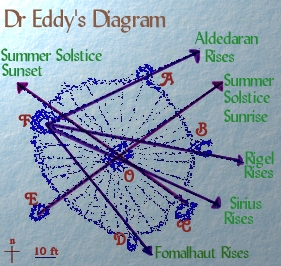At Ricks by a graded road near our house lay a four foot pond. It bred mosquitoes, of course, but then tadpoles appeared, which seemed to take care of the larvae. The attraction of such a feature in the landscape should be obvious.
We tried slinging in dirt clods and rocks to see who could make the biggest splash. The tadpoles usually wriggled back to the pond, though not always—and that meant flies, which were annoying.
A couple of us tried to throw in a quite substantial quartz rock. Alas, it was so heavy that we couldn’t give it any speed, so it made more of a minor tsunami than a splash. It sank in the mud, leaving only a pyramid an inch above the water.
Next year the pond had filled in, and was now just a minor depression with a bit of quartz sticking out of the dirt.
I saw it again a few years ago. Re-grading had covered everything over, but I knew where it had been, and where the rock still was.
The quartz boulders in the field beyond that were so sharp edged when we used to jump on them were weathered and a little overgrown, and the trees and logs were long gone, but I still remembered where they had been.
Paths we explored, the field where we played 5-man football (It is hard to field two teams with only 5 players), the route the horse took around my grandfather’s house when he borrowed a placid horse so we could ride, where the persimmons that nobody really wanted grew—I can point to all these things.
I think I spent more time reading books than playing outdoors, and books are tangible too. For a while I was in another world, and then all evaporated when it ended. Almost all, there’s a residue in the imagination (what you immerse yourself in affects you). But I could still point to the book and say “I read that.”
Our Youngest Daughter dislikes e-books intensely, even when it is the only way to read some out-of-print work, saying that there is no substitute for the tangible thing in her hands. (Most of the articles and reports I deal with are never printed out, FWIW.)
I started down this path when I started wondering what difference it made for a generation to spend leisure with intangible amusements: video games in particular, though I suppose you could expand that into videos and ubiquitous music. I think the latter are more passive, though: books and the games require something from you to keep them going. It seems as though people don’t make their own music as much as they used to—maybe competing with the ubiquitous pros is too hard. I should try counting how many people seem to be singing in the car.
I have to speak only from observation about video games: I never got into them enough to get the dexterity to enjoy them, and at this stage of my life I don’t care to invest my limited time in them. But they seem especially ephemeral. Maybe you saved the game at some point, and maybe the scores are saved for a while, but close it down and where is it? Your life has fewer tangible markers for things you’ve done.
I wrote software for DAQ, hardware diagnostics, processing and filtering, and analysis—things people needed at the time. They were ephemeral too, but the fact of their service to the team remains. True, the result is a few journal articles, some of which nobody reads anymore. But the help was something real, though intangible. So maybe I should widen my question a bit, but … maybe next time.
Perhaps the best way to say it is that I feel more grounded, maybe a bit more real, when I can point to something and say “I made that,” or “I helped that person,” or “I was there.” Maybe that’s just me, and maybe very few people are as deeply into the ephemeral as advertised. But if not, I wonder how it changes you to live with fewer and fewer markers.
Then again, suppose your accomplishments themselves are focused on the ephemeral...

